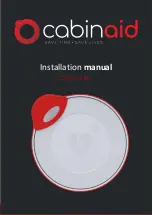
SURGE PROTECTOR
– Protects the system from lightening strikes.
1. Locate the surge protector outside where the zip wire and green ground wire exit the wall.
2. Bring the wires through the rubber gasket (it will need to be cut) and connect each end of the zip
wire (you will need to split the two wires apart) from the transmitter to the inside point of each
terminal (two bottom terminals in the surge protector – one end of the wire on each terminal).
3. Bring the ends of the twisted wire going to the boundary through the rubber gasket and attach to
the outside point of each terminal (same terminals that the zip wires are attached to – again one
wire to each side).
4. Connect one end of the ground wire (from Jan 09 this wire is green and yellow) to the ground
terminal post in the surge protector (middle terminal) and exit through the rubber gasket.
5. Install the ground rod outside the building near the surge protector.
6.
Connect the solid ground wire (green and yellow wire) and the green ground wire from the
transmitter to the earth rod with earth clamp provided. (Cut the small ring from the end of the
green ground wire as
this is for installation in the USA and attach the end of the wire
to the earth clamp).
PLANNING
1. It is important to carefully plan the installation of the boundary wire. Consider the location of
gardens, paths, pools, plants and driveway crossings. Utilise the natural boundaries of your
property. This will help in your dogs training.
2. Plan the path of the twisted wire to the boundary wire. The wire must form a continuous loop. If
you are installing for just one boundary or a gateway you must still form a loop. Lay the wires out
to form a long sausage shaped loop across the area to be excluded.
The wires in the loop
(sausage) must be a min of 2 ft apart. If less than 2 ft your wires will act as twisted cable
and cancel each other out – no signal will be emitted.
Hint: if forming a sausage loop do not
bury both the cables until you have your system working. Remember your cables do not have to
be buried.
3. Avoid sharp corners as they produce irregular radio signals, avoid creating alleys or bottlenecks
where the wire is less than 20ft away from
itself.
4. Avoid placing boundary wire too close to your
house to prevent the signal from entering
through the walls.
5. Avoid laying the wire parallel to any
underground cables or metal pipes as the
signal may be conducted by these items and
bring signal into a “safe” area.
6. The wire can be laid beneath rocks, bricks or paving slabs without effecting the signal.




























